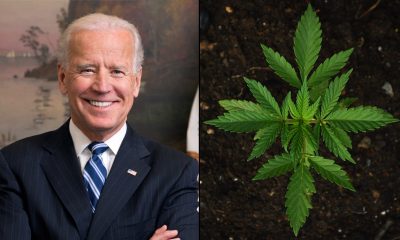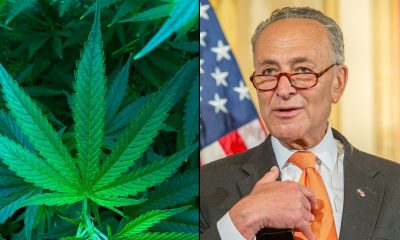Politics
Vermont Bill To Legalize Marijuana Sales In Question After Governor Cites Racial Justice Objections

The governor of Vermont on Tuesday signaled that he might veto a bill to legalize marijuana sales in the state, citing concerns about whether the legislation that has been sent to his desk adequately addresses racial equity.
Gov. Phil Scott (R) had previously centered his criticism of the policy change on issues such as impaired driving, taxes and local control. Some advocates suspect that his newly expressed worries about racial justice amount to a cop-out to justify rejecting the reform bill after legislators revised it to largely account for the other issues he’d raised.
The comments came during a gubernatorial debate between Scott and Lt. Gov. David Zuckerman (D), a vocal advocate for cannabis reform.
“In terms of the pot bill, I haven’t made up my mind about that. I have received a lot of groups—racial equity groups—that are asking me to veto it,” Scott said. “I was leaning towards letting it go, but I’m really questioning that at this point. I want to hear and listen from them.”
He also criticized the lieutenant governor, saying that as the presiding officer of the Senate, he should’ve been able to hear from these groups to get their input on the bill. Zuckerman said that the logistical challenges of legislating remotely via video conferences amid the coronavirus pandemic created difficulties in ensuring more voices could be represented the process. But he argued that the marijuana commercialization bill, S. 54, does in fact promote social equity.
“There are many provisions in the bill that do address support for minority- and women-owned businesses. And there’s definitely more work to do,” Zuckerman said at the debate, which was hosted by VTDigger. “You know as well as I, you often don’t get everything in your efforts, and there’s more work in this.” He added that separate companion legislation to automate expungements for those with prior marijuana convictions was also designed with racial justice in mind.
“Sometimes the efforts are put into multiple bills, as you know, and it’s easy to take advantage of sort of how the system can be confusing for people to maybe not always know what’s going on,” he said. “We know in the next administration, we’ll have to work to improve on that bill. But to delay it for another year is economic opportunity delayed, it is also criminal justice reform delayed, and we need to be moving forward and do more in the future.”
Scott previously alluded to organizations he’s recently heard from who opposed S. 54 during a press briefing earlier this month, but he didn’t specify that they were expressing concerns about racial equity. He also said that he was generally pleased with the process that the legislation went through as a bicameral conference committee worked to resolve differences between versions of the legalization bill that had previously passed the House and Senate.
In a letter sent to the governor last week, the Vermont Racial Justice Alliance argued that the bill “fails to address in any significant way the devastating historical social and economic impact of marijuana on African Americans, the current impact of systemic racism on the cannabis industry or the disadvantages of emerging growers!”
“In short, Black people and small farmers are not made whole and fail to economically benefit from this bill,” it states. “Please veto this policy to give us the opportunity to ensure that it addresses harm and provides everyone an opportunity to thrive.”
The Vermont Growers Association similarly voiced opposition to S. 54, writing in a recent statement that the bill “will make life harder for everyday Vermonters by artificially limiting economic development opportunities by favoring established players and creating unreasonable barriers to market entry for new participants.”
The organizations Justice For All, NOFA-VT, Rural Vermont and Trace have also put out statements against the proposal.
With these latest comments from the governor, advocates for the bill are frustrated that it seems that process and the final product will have been for naught if the governor vetoes it.
Vermont legalized possession of up to one ounce of cannabis and cultivation of two plants in 2018, but there are currently no regulations in place that allow for retail sales.
Dave Silberman, a pro bono drug policy reform advocate, told Marijuana Moment that the governor is “desperate to find any politically viable excuse to veto the cannabis regulation bill, now that the legislature has adequately addressed all of the areas he previously claimed to be concerned with: that towns opt in, rather than opt-out, of allowing cannabis retailers, that police be able to deploy saliva tests to detect impairment, and that tax revenues be allocated to prevention and after-school programming.”
“S.54 and the related expungement bill (S.234) lay a strong foundation for continued work to repair the damage done by 80 years of prohibition,” he said. “That Gov. Scott and his team never once mentioned racial equity as an area he was so much as aware of, let alone concerned with, until after the bill was finalized, says it all: he is shamelessly using racial justice as a smokescreen.”
Matt Simon, New England political director of the Marijuana Policy Project (MPP), told Marijuana Moment that “from a racial justice perspective, cannabis prohibition has been a disastrous public policy, and Vermont’s limited legalization law is only a modest improvement.”
“The legislators who developed S. 54 clearly intend to replace prohibition with an equitable, regulated industry—such as by prioritizing licensing for minority-owned businesses,” he said. “Further advocacy will be needed to ensure that the bill lives up to its promises, but the status quo is unacceptable and Vermont urgently needs to move forward.”
In an op-ed published last week, MPP Executive Director Steve Hawkins, who is Black, wrote that if both the tax-and-regulate and expungement bills are signed into law, “Vermont would go from having the worst legalization law in the country to one of the more forward-thinking.”
“Vermont’s status quo is untenable,” he said. “If our movement had insisted on every measure being perfect, Vermonters might still be criminals for possessing cannabis—medical or otherwise. S.54 and S.234 represent incredible progress for consumer safety, Vermont’s economy, and racial and social justice. They deserve Vermonters’ support and Scott’s signature.”
Under the cannabis commerce bill, a new Cannabis Control Commission would be responsible for issuing licenses for retailers, growers, manufacturers, wholesalers and labs. The body would also take over regulation of the state’s existing medical cannabis industry from the Department of Public Safety .
A 30 percent THC limit would be imposed on cannabis flower, while oils could contain up to 60 percent THC. Flavored vape cartridges would be banned.
Local jurisdictions would have to proactively opt in to allow marijuana businesses to operate in their area. Municipalities would also be able to establish their own regulations and municipal licensing requirements.
A timeline for the legislation states that it would formally take effect on October 1, 2020—but regulators would then have to make a series of determinations about rules and licensing before retail sales would launch. Dispensary licenses would have to be issued on or before October 1, 2022.
A fiscal analysis on the final bill projects that Vermont will generate between $13.3 million and $24.2 million in annual cannabis tax revenue by Fiscal Year 2025. Licensing fees will lead to additional funds for the state, but the regulatory board created by the legislation will set those levels at a later date. For now, the Joint Fiscal Office estimates the fees could lead to another $650,000 in revenue every year. Municipalities hosting marijuana businesses will also be able to levy additional local fees.
The expungements bill that is also being transmitted to his desk would make it so those with convictions for marijuana possession of up to two ounces, four mature plants and eight immature plants prior to January 2021 would have their records automatically cleared. Those who receive expungements would be notified by mail.
It’s not clear what will happen if Scott vetoes the legal cannabis sales bill. It passed the Senate with a veto-proof margin, but fell shy of that threshold in the House. The governor vetoed an earlier version of the noncommercial legalization bill in 2018 before negotiating changes with lawmakers that made him comfortable with signing a revised bill.
Montana Marijuana Legalization Initiative Endorsed By Environmental Conservation Groups
Photo courtesy of WeedPornDaily.
















